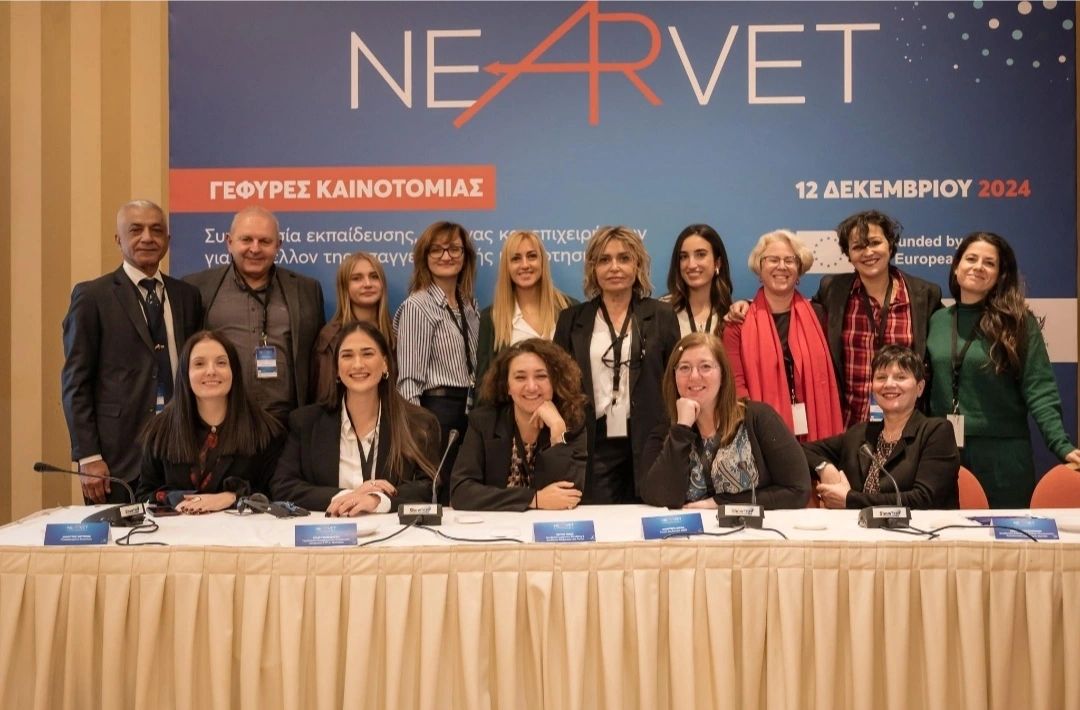On December 12, 2024, Larissa, Greece, hosted the final conference of the NEARVET project, titled “Collaboration Between Education, Research, and Business: Enhancing Innovation through Applied Research and Vocational Training.” The event brought together 124 participants from Germany, Greece, Cyprus, Sweden, Italy, and Spain, including educators, researchers, policymakers, and business representatives.
The conference explored the role of applied research in vocational education and how stronger collaborations between VET institutions, research organizations, and businesses can drive innovation. Experts discussed challenges in linking education with industry, emphasizing the importance of technology transfer, workforce adaptability, and digital transformation.
Speakers highlighted the need for vocational training to develop its own approach to applied research, rather than mirroring university methodologies. The NEARVET digital platform was also introduced as a free resource for knowledge exchange and professional development.
The event featured the NEARVET Competition, which highlighted three outstanding projects in applied research, demonstrating innovation and practical solutions in vocational education and industry.
One of the winning projects, Enia Foods from Greece, focused on sustainable packaging solutions for the food industry. By integrating eco-friendly materials and innovative packaging techniques, the project aims to reduce environmental impact while maintaining product quality and safety.
Another recognized initiative was VET Metaverse from Sweden, which introduced virtual reality (VR) technology into construction vocational training. This project offers an immersive and interactive learning experience, allowing trainees to develop essential skills in a simulated, risk-free environment, enhancing both safety and efficiency in workforce preparation.
The third award-winning project, Wastewater Analysis from Italy, tackled environmental challenges by developing advanced methods for wastewater treatment and analysis. This initiative aims to contribute to sustainable water management, addressing key concerns related to pollution and resource conservation.
Each of these projects was recognized for their innovative contributions to vocational education and industry, receiving support to further develop their solutions. This recognition reinforces the importance of applied research in driving innovation, sustainability, and practical advancements in vocational training.
The conference reinforced the importance of strengthening ties between VET, research, and industry to enhance skills development and economic growth. Participants agreed that collaborative, innovation-driven approaches are key to ensuring that vocational education remains relevant, adaptable, and impactful in an evolving labor market.
This event marked a significant step in reshaping the future of VET through applied research and industry engagement, paving the way for more dynamic and future-proof vocational education systems across Europe.
HomeΑdvertisementFinal Conference
Categories
- Academy (1)
- Additional Material (12)
- Commercial (4)
- Educate (1)
- Office (1)
- Shop (1)
- Studio (1)
- Uncategorized (1)
- Αdvertisement (9)
Elena Grilli
Managing Director
Elena holds a Msc in political science and European law. She has a long professional experience on program and project development in the fields of VET, social inclusion, and labour market policies, particularly with vulnerable groups. Has worked as a project manager, evaluator, and content expert for public and private agencies, being responsible for small and large teams of experts/project staff with field experience in the EU28, Middle East, Asia, Subsaharan Africa, Caribbean, and Eastern and candidate countries. She’s director of MetropolisNet since 2023.
Location: Milano, Italy

